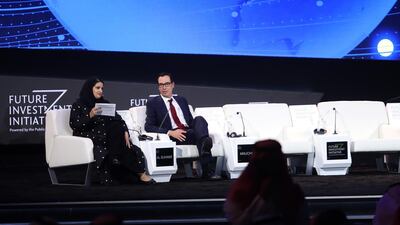The United States and China are expected to sign the first phase of a bilateral trade deal next month after 16 months of trade tensions, which is an “important economic achievement” for the two countries, the US Secretary of the Treasury, Steven Mnuchin, said.
“We are looking forward to President Trump and President Xi signing phase one of our important trade agreement later next month together when they are in Chile,” Mr Mnuchin, who has been at the forefront of US-China trade negotiations, told delegates at the third Future Investment Initiative (FII) in Riyadh on Wednesday.
His comments followed those of White House senior adviser, Jared Kushner, who said on Tuesday at FII that the US has had "an honest dialogue with China" and both have come to an understanding on the direction of their trade relationship. Mr Kushner said Secretary Mnuchin and US Trade Representative Robert Lighthizer have done “a fabulous deal”.
The secretary did not give further details of the planned deal during his short onstage interview with Sarah Al Suhaimi, chairwoman of the Saudi Stock Exchange, Tadawul.
Addressing a trade imbalance with China has been one of the key campaign promises of US President Donald Trump, who has been engaged in a tit-for-tat tariff war with China, the world’s second-largest economy after the US. However, the trade rift has pulled down growth in trade volumes globally to just 1 per cent in the first half of this year - the weakest level since 2012. Business confidence has ebbed and the manufacturing sector has also taken a hit, which has pushed the world’s economic growth lower.
The global economy is in a “synchronised slowdown” and projected to decelerate to 3 per cent this year, from 3.6 per cent in 2018, its slowest expansion since the 2008 global financial crisis, as a result of protectionist policies and increased uncertainty related to trade and geopolitics, the International Monetary Fund said earlier this month. The forecast is the fund's fifth consecutive downward revision for the global economy for 2019.
Trade conflicts could cost the global economy around $700 billion (Dh2.57 trillion), or 0.8 per cent of its output by 2020 as trade growth across the world comes to “a near standstill”, the IMF said.
"There is no question that global growth is falling down …. and that’s had some modest drag on the US economy,” Mr Mnuchin said.
However, he added that the economic outlook for the US is “still very good”.
“We continue to see very strong employment, very low inflation and still [a] tremendous amount of capital coming back into the US to be invested. The consumer [sector] is very strong.”
The economic picture in Europe is less rosy, though, and is a cause for concern, he added.
“With negative interest rates, there’s only so much you could do on the monetary side so I think they really need to do more on the fiscal side,” he said.


